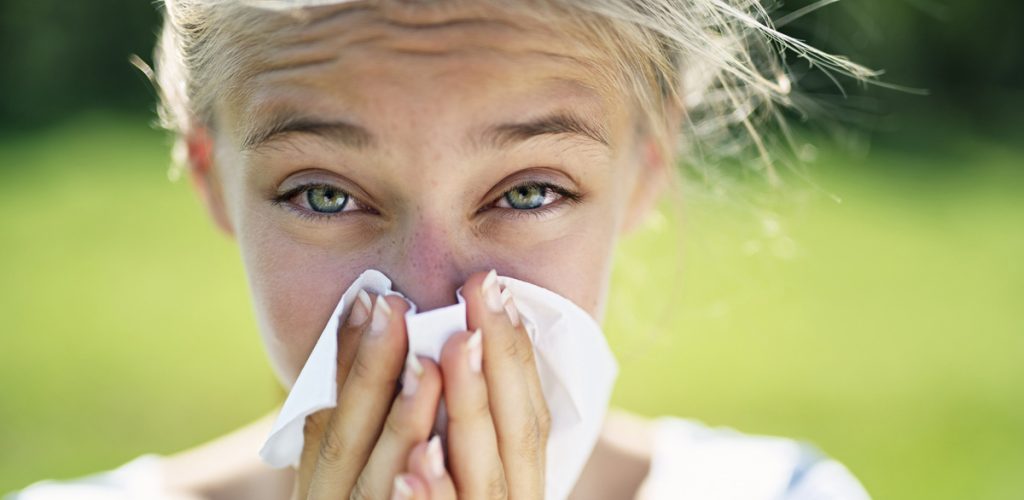If you suffer from spring-time hay fever, help is at hand…
Glorious spring!
Though often wild, wet, windy and chilly, the arrival of spring slowly but surely brings more sunshine into our lives. Longer daylight hours provide more opportunity to venture outside. After winter’s hibernation we have more time and inclination to reconnect with others and with nature. Everything starts to look up!
Spring brings vibrant colour and life, newborn lambs, daffodils, freesias…A picture of glorious beauty with gardens blooming, lush grass, thriving foliage, and bees buzzing.
Not-so glorious hay fever
However, for many people the arrival of spring also heralds the arrival of troublesome allergies as pollen and grass trigger hay fever (allergic rhinitis) symptoms including irritated, streaming eyes, tickly, runny noses, congested sinuses, and uncontrollable fits of sneezing.
Depending on its severity, hay fever can interfere greatly with daily life. Allergies can make it difficult to sleep, cause daytime fatigue, hinder your productivity, and generally leave you feeling miserable.
The suffering can continue through the summer months too as nature continues to blossom. Pohutukawa trees in full bloom are a beautiful symbol of Christmas and summer, but this iconic flower’s pollen can be yet another hay fever trigger for some…Not a joyous aspect of Christmas at all!
For some people hay fever can continue year round, triggered by allergens such as dust mites and animal dander.
Conventional treatment can be complemented by a naturopathic approach
Over-the-counter and prescription antihistamines can be helpful in dampening down the allergic response and reducing hay fever symptoms. Nasal corticosteroids, decongestants, and saline rinses can also be used to manage symptoms in the short term.
A targeted, individualised, naturopathic treatment approach can be a powerful natural way to modify the allergic process, helping you to become less reactive, and less reliant on antihistamines and other conventional treatments.
A higher tolerance threshold can be developed to substances you’ve found to be problematic, such as seasonal pollens and grasses, and other aspects of your health can be improved at the same time.
Understanding allergies
Allergies occur when a person’s immune system reacts to a substance, or allergen, such as pollen, that is harmless to most people.
An allergic response involves the release of histamine, a chemical signal secreted by specific cells when exposed to an allergen. Histamine causes the inflammatory symptoms associated with hay fever.
People’s sensitivities to allergens vary, and an allergen that triggers a reaction in one person may not affect another at all. This is due to your individual, unique immune response, which can be influenced by your genes. People with eczema and asthma may also be more susceptible to seasonal hay fever allergies.
Understanding the underlying cause is helpful in terms of prevention – the best way to avoid an allergic reaction is to avoid the trigger, however this isn’t always possible or practical.
Naturopathic support – immune system and gut health focus
To relieve symptoms of allergic reactions, naturopathic support focuses on improving your tolerance threshold by supporting the health and function of the immune system.
Histamine is a key part of your body’s natural immune response, helping to defend against invading allergens by producing allergic reactions. This can be beneficial, for example a sneeze can remove allergens from your system. However, when histamine is present for longer than necessary, it can become problematic as inflammation lingers.
Histamine is usually eliminated rapidly from the body, predominantly by two enzymes: Diamine oxidase (DAO) and histamine n-methyltransferase (HNMT). Either or both enzymes can be underactive, which can slow the clearance of histamine and result in an accumulation in the body, and can lead to allergic responses including hay fever, eczema, and asthma.
There is a strong connection between gut health and immune reactivity, so a key naturopathic focus is to support good digestive system function and health.
A thriving gut microbiome supports digestion, nutrient absorption, and the immune system. A healthy gut can influence the immune system’s response. By strengthening gut health you can better equip your body to handle seasonal allergens.
Dietary considerations
The foods you eat can alter microbes in the gut which regulate immune function, as well as cause inflammation in the lining of the digestive tract.
Diet can also contribute to a histamine overload which can reduce an individual’s tolerance threshold and exacerbate allergic reactivity. It may be necessary to avoid certain histamine-rich foods such as fermented foods and aged cheeses for a time, as these can add to the body’s overall histamine load.
Some species of gut bacteria produce histamine. Supporting gut health and a healthy balance of gut bacteria in turn supports a healthy histamine response.
Other foods and beverages such as tea, energy drinks, and alcohol block the production of the DAO enzyme, responsible for breaking down ingested histamine.
Vitamin C-rich foods provide potent antioxidant and anti-inflammatory effects, and support healthy histamine levels, by directly lowering histamine in the blood and supporting DAO.
Increasing intake of fruits, vegetables and healthy sources of omega-3 fatty acids help to reduce inflammation.
No two individuals will experience the same symptoms in the same way or follow an identical diet.
A naturopath will work with you as a unique individual to help figure out how your diet might be impacting your allergy picture, and guide careful, considered dietary adjustments without unnecessary restrictions.
Lifestyle factors
Wherever possible, reduce exposure to allergens. High pollen times are usually early mornings, late evenings, and windy days. If you need to be outside, wearing a mask can help. A quick, pollen-removing shower and change of clothes after being outside can provide relief.
Reducing stress can be particularly important when managing allergy and reactivity, as stress reduces immune tolerance and can make symptoms worse.
Stress can manifest in many ways and is different for everyone. A naturopath will help you examine and understand how stress may be contributing to your allergy symptoms. You can then learn relevant, tailored strategies to better manage your stress load, feel calmer, more positive, and in control.
Herbal and nutritional support
A naturopath will choose from a vast array of herbal and nutritional medicine options to support:
- Reducing the frequency and severity of the allergic, hay fever response by modulating immune activity
- Reducing oxidative stress and inflammation
- Restoring mucous membrane integrity and function, clearing congestion, easing hay fever symptoms
- Supporting a healthy gut microbiome with healthy balance of gut bacteria
Herbal medicine
Many herbs are indicated for hay fever support with useful herbal actions including:
- Antiallergic
- Anti-inflammatory
- Antioxidant
- Anti-catarrhal (reduces mucous secretion)
- Immune modulating
Herbs offer a powerful, natural way to help manage allergies. Some of the herbal options include:
- Albizia
- Baical Skullcap
- Nigella Sativa
- Feverfew
- Chamomile
- Ginger
- Rosemary
- Turmeric
- Eyebright
- Tinospora
- Pomegranate
- St Mary’s Thistle
A qualified naturopath/medical herbalist can create a personalised herbal formula to suit your specific needs that is safe, appropriate, and at the right therapeutic dose to be effective for you.
The bonus is that a personalised herbal combination can also benefit other aspects of your health at the same time, encompassing a holistic approach.
Nigella for example, not only reduces symptom severity scores of seasonal allergic rhinitis, but has also been shown to benefit the cardiovascular system, protects the liver, and shows encouraging cancer-protective activity.
Nutritional medicine
Therapeutic goals would ideally be achieved mostly through diet, but nutritional supplementation will often be recommended for added support and can be extremely helpful. Examples of some key nutrients to be considered include:
- Omega-3 fatty acids (good quality, high purity fish oil)
- Probiotics (strain-specific)
- Vitamin C
- Vitamin A
- Zinc
- Quercetin
A qualified naturopath is able to recommend safe, appropriate options for you.
Stop the suffering – be proactive and combat seasonal allergies
As flowers blossom and pollen fills the air, many people fall prey to spring-time hay fever.
If this is you, I’m here to help. There are steps you can take now, to overcome seasonal allergies.
Let’s get started – book in for an initial naturopathic consultation today!


